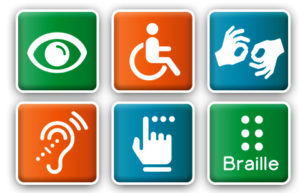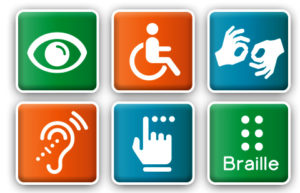
Reasonable accommodation under the Rehabilitation Act of 1973 as amended by the American with Disabilities Act of 1990, requires federal agencies to provide reasonable accommodation to qualified individuals with disabilities who are employees or applicants for employment.
Reasonable accommodations can apply to the duties of the job and/or where and how job tasks are accomplished. The accommodation should help the employee to successfully perform the essential functions of their position. Examples of accommodations are providing interpreters, readers, modifying job duties, restructuring work sites, providing accessible technology and adaptive equipment.
Employees should inform their supervisor if an accommodation is needed; this may be done verbally or in writing.
A family member, healthcare provider or other representative may also request reasonable accommodation on behalf of an employee.
The RA process begins as soon as a request for accommodation is made. Supervisors will need to discuss with an employee the job-related limitations and how those limitations could be overcome with reasonable accommodation. Supervisors may request the description of the disability, the requested accommodation and sufficient medical documentation that supports or confirms the disability and the need for the accommodation when the disability or need is not obvious.
In consultation with the employee the supervisor will identify potential accommodations and assess the effectiveness each would have in assisting the employee in performing essential functions of their job.
In circumstances or situations where the employee and the supervisor do not agree on the most appropriate accommodation, the supervisor can consult with the Installation Disability Program manager located in the Civilian Personnel Office to help determine the appropriate, effective reasonable accommodation.
The agency will provide the employee a decision within 30 days from the date of the original request if there are no extenuating circumstances. Examples of extenuating circumstances could be an outstanding request for medical documentation, purchase of equipment and facility modifications/improvements.
If timeframes cannot be met, the employee must be notified of the reasons for the delay and the approximate date on which a decision is expected.
If a request for reasonable accommodation is denied, management must notify the employee in writing. Denials must include specific reasons and that the employee has the right to file an Equal Employment Opportunity complaint, the procedures for doing so, as well as identify and explain the avenues available for informal dispute resolution.
For questions concerning reasonable accommodation contact Mary Bogart at 661-277-7778; mary.bogart@us.af.mil or Deborah Perkins at 661-277-8162; deborah.perkins.1@us.af.mil. To request a sign language interpreter contact Amber Ludwig at 661-275-3460; amber.ludwig@us.af.mil.












